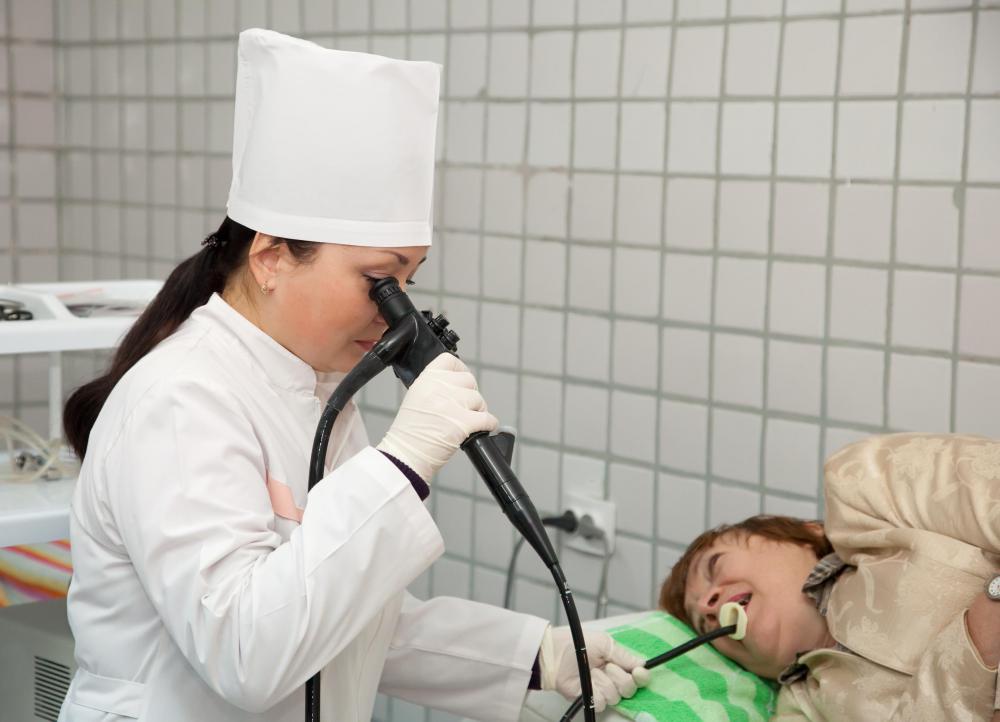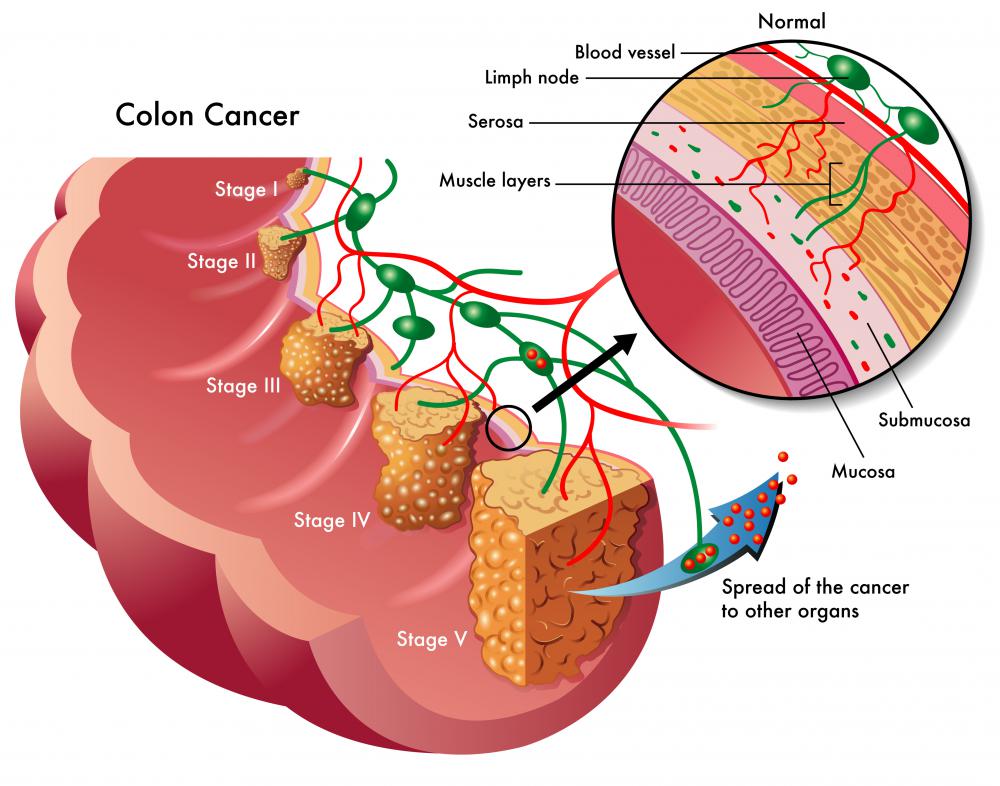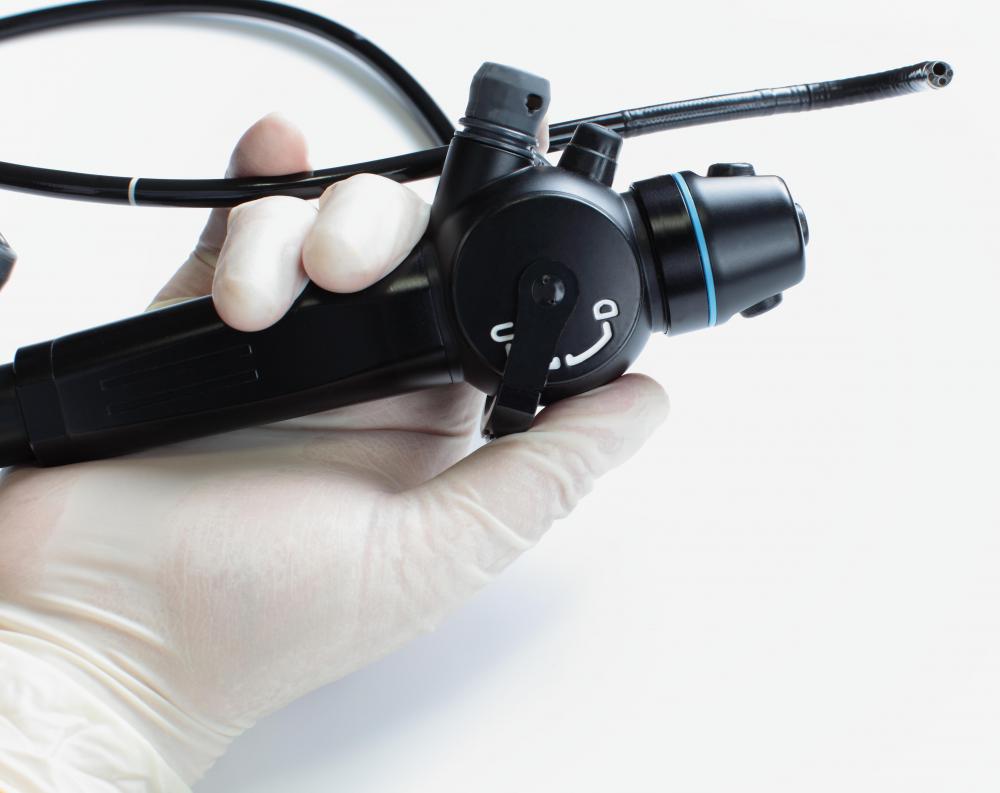At TheHealthBoard, we're committed to delivering accurate, trustworthy information. Our expert-authored content is rigorously fact-checked and sourced from credible authorities. Discover how we uphold the highest standards in providing you with reliable knowledge.
What are Hyperplastic Polyps?
Hyperplastic polyps are benign tumors of the small bowel, which in most cases grow slowly and remain asymptomatic. More rarely, the tumors might grow at a more rapid rate or grow larger than normal, causing symptoms such as pain and digestive problems. About 90 percent of all polyps found in the small bowel are hyperplastic. The remaining 10 percent are either adenomas, which are benign tumors that are of glandular origin, or are associated with a syndrome that leads to overgrowth of polyps.
The small bowel comprises approximately three-quarters of the length of the gastrointestinal tract, but very few malignant tumors arise here. Most tumors that develop in the small bowel are benign. Several types of tumors can develop in the various different sections of the small bowel, including adenomas, lipomas, hemangiomas, gastrointestinal stromal tumors and hyperplastic polyps.

Polyps can grow in any section of the small bowel, including the duodenum, jejunum and ileum. All tumor types, including hyperplastic polyps, are more likely to grow in the ileum than any other section. Generally, small bowel tumors are relatively isolated occurrences, with just one or a few forming. For some people, the development of polyps is part of hyperplastic polyposis syndrome, which leads to the growth of multiple polyps, often in all three sections of the small bowel.

Like most benign small bowel tumors, hyperplastic polyps tend to be asymptomatic. Rarely, a polyp might cause intestinal pain or gastrointestinal bleeding. Even more rarely, the growth of multiple tumors might lead to bowel obstruction or intussusception, in which one portion of bowel becomes displaced and slides into the next section.
Asymptomatic polyps often are discovered during a routine endoscopy or during an endoscopy carried out for purposes unrelated to the existence of the polyps. When polyps are discovered, they can be removed via relatively noninvasive methods such as endoscopy; open surgery is rarely required. In endoscopy, a thin tube equipped with surgical tools, a light source and a video camera is passed through the esophagus, past the stomach and into the small bowel. The surgeon uses the images generated by the camera to guide the tools and remove the polyps.

It is very rare for hyperplastic polyps to become malignant. Generally, only polyps associated with hyperplastic polyposis syndrome have the ability to become cancerous. A hyperplastic polyp has less than a one percent chance of becoming malignant. Even so, the presence of one or more polyps does increase the risk of colon cancer, so polyps often are removed after they are found, even if they are asymptomatic.
AS FEATURED ON:
AS FEATURED ON:















Discussion Comments
Colonoscopies will detect these polyps. This is inserted in the rectum. When found, they should be removed to prevent obstruction of the colon. -- colorectal nurse
I had four polyps removed during a routine colonoscopy screening. No pain at all. They are benign.
I found this link following talking with my longtime gastroenterologist about the results of my most recent, every-three-years colonoscopy performed by him. (I have an immediate family history of colon cancer, plus I have diverticulosis, IBS-C, and a history of abdominal adhesions, which caused small bowel obstructions. I hadn't heard of "hyperplastic" colon polyps before, but one of the two polyps found in my exam last week was one of these.
The part that got my attention in the above article, is where they describe how these polyps can grow large or evasive enough to help bring about such obstructions. Now that is also something that none of us should ever want to experience, let me tell you! So for that reason alone, get those procedures regularly, if/when your physician advises you to.
They can be detected and removed with a colonoscopy. I just had one removed.
I just had a colonoscopy and they did find two hyperplastic polyps. Both were removed during the colonoscopy. The polyps were sent to the lab and both were benign. I'm due for my next colonoscopy in five years.
Benign or not, this does not sound like something I would want to have. I suppose an endoscopy can be considered to be not very invasive compared to being cut open with traditional surgery. However, any instrument being inserted through the mouth, down to the stomach, and into the intestines sounds pretty invasive to me!
I'd rather not have any hyperplastic polyps in the first place. Is there a way to avoid them? Do they appear because of things we eat, or from not taking care of ourselves the right way? Or are they completely random and unpredictable?
I have a friend who had some of these, and had to get them removed with an endoscopy. When I heard about it I was amazed. I can't believe it's possible to remove something from the intestines with something that goes in through the mouth! And the fact that it's done with the use of a camera, and that the doctor can't even see what's going on without it, makes it even better!
Even if it was an amazing process though, he certainly doesn't want to have to go through it again. If you have had to get a hyperplastic colon polyp removed, are you at a higher risk of getting more?
Can a colonoscopy detect these polyps? If so, it sounds like it would be a good idea to get one regularly. Even if they are benign most of the time, I would want them gone if there was any possibility at all of them becoming cancerous. Having a few polyps removed sounds a lot easier than undergoing cancer treatment. It's better to be safe than sorry, in my opinion.
Post your comments